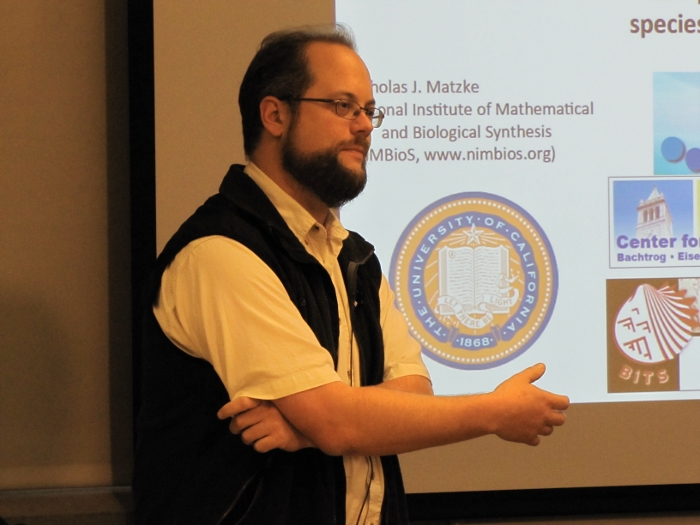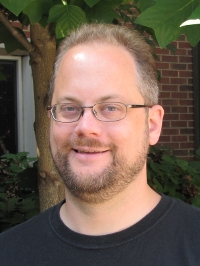NIMBioS Seminar Series
In conjunction with the interdisciplinary activities of the National Institute for Mathematical and Biological Synthesis (NIMBioS), a seminar series on topics in mathematical biology will be hosted at NIMBioS every other Tuesday at 3:30 p.m. (unless otherwise noted) in Room 105, Claxton Building, 1122 Volunteer Blvd. Seminar speakers will focus on their research initiatives at the interface of mathematics and many areas of the life sciences. Light refreshments will be served in the 1st floor visitor breakroom beginning 30 minutes before each talk. Faculty and students from across the UT community are welcome to join us.
Time/Date: Tuesday, October 29, 2013, 3:30 p.m.*
Location:
Room 105, Claxton Building, 1122 Volunteer Blvd.
Speaker:
Dr. Nicholas Matzke, NIMBioS postdoctoral fellow
Topic:
Statistical model choice in phylogenetic biogeography: Inference of speciation processes and ancestral range, and prospects for integration with species distribution modeling (SDM)
Abstract: Historical biogeography has been characterized by unresolved debates about which processes, such as dispersal or vicariance, are most important for explaining geographic distributions. Biogeography programs typically make fixed assumptions about which processes are allowed, and these assumptions dominate inference. A new R package, BioGeoBEARS (phylo.wikidot.com/biogeobears), implements the most popular models (LAGRANGE DEC, DIVA, BayArea) in a common likelihood framework, and adds new "+J" models that allow jump dispersal/founder-event speciation. Statistical model choice shows that founder-event speciation is a crucial process in almost every clade, although it is measurably weaker in non-island systems. Simulations indicate that better models estimate ancestral ranges with dramatically greater confidence, and higher accuracy. All of these models are special cases of a supermodel implemented in BioGeoBEARS, enabling estimation of the relative importance of different speciational modes given sufficient data. At the conclusion of my talk, I outline a program to expand this research by linking phylogenetic biogeography with species distribution modeling (SDM). Standard SDM is done one-species-at-a-time, ignoring phylogenetic autocorrelation, and typically ignores non-climatic causes of distributions such as dispersal limitation. As a result, all of these factors are confounded in current environmental niche models. With a combined approach we may be able to untangle these factors.
*Join us for refreshments at 3 p.m. in the 1st floor visitor breakroom.
Seminar Flyer (pdf)
For more information about this and other NIMBioS Seminars, visit /seminars.

NIMBioS
1122 Volunteer Blvd., Suite 106
University of Tennessee
Knoxville,
TN 37996-3410
PH: (865) 974-9334
FAX: (865) 974-9461
Contact NIMBioS



